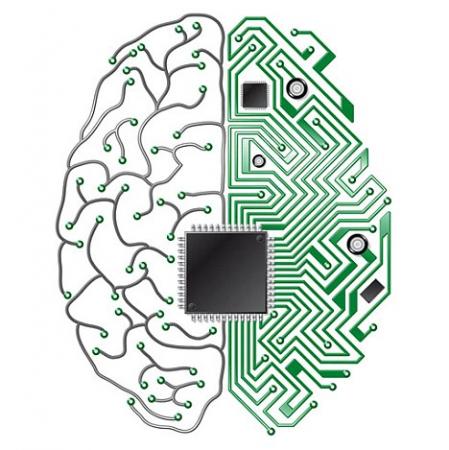电脑模拟人类大脑的挑战在过去的几十年间突出了科学的缺陷。近来,IBM研究人员称,它们在2个世界的结合方面做出了关键的一步。

IBM开发出能模拟人脑思维的芯片
美国技术公司已研制2个芯片原型。在数据的处理方式上,它们要比目前PC机和超级计算机更像人类大脑。
对为期6年的工程来说,芯片的研发成功是一个重要的里程碑。美国政府国防高级研究计划局(DARPA)对这一工程提供4100万美元的资助,IBM也提供数目不详的资助。
智能芯片从实验室研发向实际产品的转变还需要10年或更长时间。
但是,Wisconsin大学的精神学教授Giulio Tononi 称,重要的不是智能芯片做了什么,而是怎样去做。
生物探索推荐英文原文
IBM develops first 'brain chips' capable of mimicking the process of human thought
The challenge in training a computer to behave like a human brain has tested the limits of science for decades.
But researchers from IBM today said they have made a key step towards combining the two worlds.
The U.S. technology firm has built two prototype chips that it says process data more like how humans digest information than the chips that currently power PCs and supercomputers.
The chips represent a significant milestone in a six-year-long project that has involved 100 researchers and some $41million (£25million) in funding from the U.S. government's Defense Advanced Research Projects Agency (Darpa). IBM has also committed an undisclosed amount of money.
The prototypes offer further evidence of the growing importance of 'parallel processing', or computers doing multiple tasks simultaneously.
That is important for rendering graphics and crunching large amounts of data.
The uses of the IBM chips so far are prosaic, such as steering a simulated car through a maze, or playing Pong.
It may be a decade or longer before the chips make their way out of the lab and into actual products.
But what is important is not what the chips are doing, but how they are doing it, says Giulio Tononi, a professor of psychiatry at the University of Wisconsin at Madison who worked with IBM on the project.
The chips' ability to adapt to types of information that it wasn't specifically programmed to expect is a key feature.
Professor Tononi said: 'There's a lot of work to do still, but the most important thing is usually the first step and this is not one step, it's a few steps.'
Technologists have long imagined computers that learn like humans. iPhone or Google servers can be programmed to predict certain behaviour based on past events.
But the techniques being explored by IBM and other companies and university research labs around 'cognitive computing' could lead to chips that are better able to adapt to unexpected information.
IBM's interest in the chips lies in their ability to potentially help process real-world signals such as temperature or sound or motion and make sense of them for computers.
The New York state-based firm is a leader in a movement to link physical infrastructure, such as power plants or traffic lights, and information technology, such as servers and software that help regulate their functions.
Such projects can be made more efficient with tools to monitor the myriad analogue signals present in those environments.
Dharmendra Modha, project leader for IBM Research, said the new chips have parts that behave like digital 'neurons' and 'synapses' that make them different than other chips.
Each 'core', or processing engine, has computing, communication and memory functions.
He said: 'You have to throw out virtually everything we know about how these chips are designed.
'The key, key, key difference really is the memory and the processor are very closely brought together. There's a massive, massive amount of parallelism.'
The project is part of the same research that led to IBM's announcement in 2009 that it had simulated a cat's cerebral cortex, the thinking part of the brain, using a massive supercomputer.
Using progressively bigger supercomputers, IBM had previously simulated 40 per cent of a mouse's brain in 2006, a rat's full brain in 2007, and 1 per cent of a human's cerebral cortex in 2009.
A computer with the power of the human brain is not yet near. But Professor Modha said the latest development is an important step.
'It really changes the perspective from "What if?" to "What now?"' he said.
'Today we proved it was possible. There have been many sceptics, and there will be more, but this completes in a certain sense our first round of innovation.'







